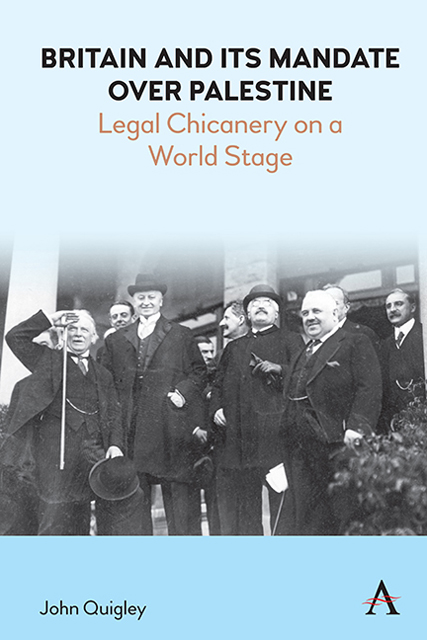Book contents
- Frontmatter
- Contents
- Preface
- Setting the Stage: Was Britain’s Rule in Palestine Legal?
- 1 The Balfour Declaration Is the Focal Point for the Legal Situation of Palestine
- 2 The Balfour Declaration Was a Binding Commitment to the Jewish People
- 3 The Jewish National Home Meant a Jewish State
- 4 The Balfour Declaration Was Issued to Affirm Jewish Rights in Palestine
- 5 The Paris Peace Conference Raised Jewish Statehood to the International Level
- 6 Britain’s Allies Made the Balfour Declaration an International Commitment
- 7 Britain’s Allies Endorsed Jewish Rights
- 8 Britain Took on Palestine Because of the League’s Mandate System
- 9 The League of Nations Protected Palestine’s Arab Population
- 10 Britain Was Given Palestine by the League of Nations
- 11 The League of Nations Put the Palestine Mandate into Legal Force
- 12 The Peace Treaty with Turkey Legalized Britain’s Status in Palestine
- 13 The Palestine Mandate Document Was a Treaty between Britain and the League
- 14 The League of Nations Required Britain to Implement the Balfour Declaration
- 15 The Palestine Mandate Document Implemented the League Covenant
- 16 The Palestine Mandate Document Recognized Jews as a National Group
- 17 The Palestine Mandate Document Bound Britain to the Balfour Declaration
- 18 The International Community Committed Itself to the Balfour Declaration
- 19 Britain Held Legal Status in Palestine
- 20 The United Nations Charter Carried Forward a Jewish Entitlement to Statehood
- Postscript: Why History Matters
- Documents Annex
- Notes
- Bibliography
- Index
18 - The International Community Committed Itself to the Balfour Declaration
Published online by Cambridge University Press: 10 January 2023
- Frontmatter
- Contents
- Preface
- Setting the Stage: Was Britain’s Rule in Palestine Legal?
- 1 The Balfour Declaration Is the Focal Point for the Legal Situation of Palestine
- 2 The Balfour Declaration Was a Binding Commitment to the Jewish People
- 3 The Jewish National Home Meant a Jewish State
- 4 The Balfour Declaration Was Issued to Affirm Jewish Rights in Palestine
- 5 The Paris Peace Conference Raised Jewish Statehood to the International Level
- 6 Britain’s Allies Made the Balfour Declaration an International Commitment
- 7 Britain’s Allies Endorsed Jewish Rights
- 8 Britain Took on Palestine Because of the League’s Mandate System
- 9 The League of Nations Protected Palestine’s Arab Population
- 10 Britain Was Given Palestine by the League of Nations
- 11 The League of Nations Put the Palestine Mandate into Legal Force
- 12 The Peace Treaty with Turkey Legalized Britain’s Status in Palestine
- 13 The Palestine Mandate Document Was a Treaty between Britain and the League
- 14 The League of Nations Required Britain to Implement the Balfour Declaration
- 15 The Palestine Mandate Document Implemented the League Covenant
- 16 The Palestine Mandate Document Recognized Jews as a National Group
- 17 The Palestine Mandate Document Bound Britain to the Balfour Declaration
- 18 The International Community Committed Itself to the Balfour Declaration
- 19 Britain Held Legal Status in Palestine
- 20 The United Nations Charter Carried Forward a Jewish Entitlement to Statehood
- Postscript: Why History Matters
- Documents Annex
- Notes
- Bibliography
- Index
Summary
The British Government's efforts to make it appear that an international obligation to implement a Jewish national home was being imposed on it allowed proponents of that concept to argue that the international community had embraced Jewish rights in Palestine. Noting that the mandate document reproduced the Balfour Declaration, Felix Frankfurter wrote, “Thus was the Balfour Declaration made part of the law of nations, and thereby the establishment of a Jewish national home became an international obligation.”
It became an element of the Narrative that a Jewish national home was sanctified in a way that neither the Palestine Arabs nor anyone else could oppose. “Virtually the whole international community, as it existed in the era between the two World Wars,” Yoram Dinstein claimed, “was legally committed to the Mandate for Palestine, which included the obligation for the establishment in Palestine of a national home for the Jewish people.” Dinstein elaborated that an obligation to promote a Jewish national home was undertaken by all states that were members of the League of Nations. “Through the Mandate for Palestine (as an international agreement), the entire membership of the League of Nations became bound by the Balfour Declaration.” Dinstein's rationale was that the document was a treaty involving the League as one party, hence it would be binding on all League member states.
Maurice Hirsch, an Israeli lawyer who served as chief prosecutor in Israel's military courts in the Palestine territory that Israel occupied in 1967, argued along the same lines. Hirsch said that the international community backed a Jewish home in Palestine, and he saw this support as the legal underpinning of the Jewish statehood that was declared in 1948. Hirsch started from the San Remo meeting. “The first decision of the international community to support the establishment of ‘a national home for the Jewish people’ was made in the post-World War I conference held in San Remo, Italy, in April 1920.” From there, Hirsch moved to the Council of the League of Nations. “In 1922,” he wrote, “the League of Nations, the predecessor of the United Nations, reconfirmed the international community's support for ‘a national home for the Jewish people’ and placed responsibility on the British mandate ‘for putting into effect’.”
- Type
- Chapter
- Information
- Britain and its Mandate over PalestineLegal Chicanery on a World Stage, pp. 133 - 138Publisher: Anthem PressPrint publication year: 2022



